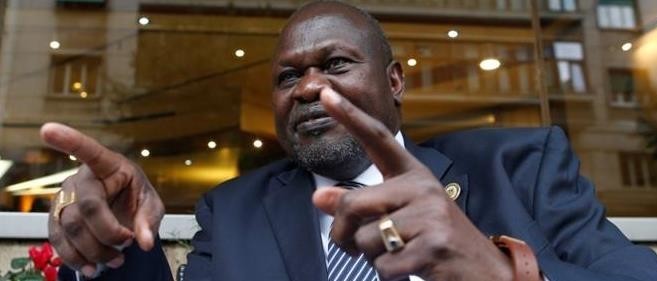Exiled opposition leader Riek Machar returned to Sudan this afternoon after he rejected calls to consider joining a unity government by November 12.
Dr. Machar, who was meant to return to Juba to join a power-sharing government as first vice-president after the signing of the peace deal in September last year, wants to extend the formation of a transitional government.
The rebuff from the leader of the main opposition group in South Sudan would be a major blow to the implementation of the peace agreement, according to several observers.
Manawa Peter Gatkuoth, the deputy spokesman for Machar’s SPLM-IO, told Radio Tamazuj that Machar returned to Khartoum after his meetings with the UN Security Council delegation and President Salva Kiir in Juba.
He said talks between Kiir and Machar have so far failed to bear any tangible fruits over the outstanding issues, and time is running out for the formation of a unity government.
The deputy spokesman said the main opposition group would not consider a so-called unity government unless a unified army is created, a key condition of the revitalised peace deal.
“Our position is very clear, we will not join a unity government until security arrangements are implemented fully,” he said.
Manawa pointed out that the SPLM-IO leadership rebuffed calls to establish a coalition government with President Kiir before critical pending issues are resolved.
“If security arrangements are not implemented, the country will definitely slide back into civil war. We want our country to have a national army that will defend the constitution and protect the people of South Sudan,” he said.
The UN Security Council delegation said that the outstanding issues raised by Machar during their meeting shouldn’t delay the formation of the unity government by November 12.
“The UN Security Council failed to do something when innocent civilians were killed in 2013 in Juba, where UN peacekeepers couldn’t provide protection,” Manawa said.
He pointed out that the 2015 peace agreement held for only a matter of months before fighting resumed due to unresolved pending issues.
“In 2016, Machar was also put under pressure to form a unity government with Kiir before the implementation of the security arrangements, but when fighting erupted again, nobody came from the international community to intervene,” Manawa explained.
In May, all parties to the revitalised peace agreement agreed to form a unity government by November 12. The implementation of the peace agreement has been riddled with delays.
The deal, signed under pressure from international and regional powers, lays out a set of requirements, including the creation of a unified army and the formation of a unity government that will run the country for three years until elections.




